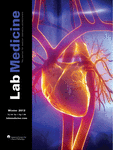
AMERICAN JOURNAL OF CLINICAL PATHOLOGY
Scope & Guideline
Catalyzing Innovations in Pathology and Forensic Medicine
Introduction
Aims and Scopes
- Clinical Diagnostics:
The journal emphasizes research related to diagnostic methodologies, including the implementation of new technologies (e.g., AI and machine learning) in clinical settings to improve diagnostic accuracy and efficiency. - Molecular Pathology:
Research articles often explore the molecular underpinnings of diseases, including genetic mutations and biomarkers, contributing to personalized medicine and targeted therapies. - Hematopathology:
A significant focus on hematologic disorders, including the diagnosis and characterization of various leukemias and lymphomas, is evident in the journal's publications. - Transfusion Medicine and Blood Banking:
The journal includes studies on blood transfusion practices, the management of blood products, and the implications of blood group serology in clinical practice. - Public Health and Epidemiology:
Research highlighting the impact of pathology findings on public health, including infectious diseases and the implications of laboratory results on population health, is a key area of interest. - Quality Improvement in Laboratory Practices:
The journal promotes articles that address quality assurance, laboratory management, and process improvements in clinical pathology to enhance patient safety and care.
Trending and Emerging
- Artificial Intelligence in Pathology:
A notable increase in research on the application of AI and machine learning in diagnostic pathology is evident, focusing on enhancing diagnostic accuracy and workflow efficiency. - Genomic and Precision Medicine:
There is a rising trend in articles addressing the integration of genomic testing in clinical pathology, contributing to personalized treatment strategies for various cancers and genetic disorders. - Telepathology and Digital Pathology:
The pandemic has accelerated interest in telepathology and digital pathology solutions, with increasing studies exploring their feasibility, efficiency, and impact on pathology practice. - Multidisciplinary Approaches to Pathology:
Emerging research emphasizes collaborative approaches that integrate pathology with other medical disciplines, enhancing diagnostic processes and patient management. - Impact of COVID-19 on Laboratory Practices:
The journal features articles examining the effects of the COVID-19 pandemic on laboratory operations, testing practices, and the overall healthcare system.
Declining or Waning
- Traditional Histopathology Techniques:
There is a noticeable decrease in articles focused solely on traditional histopathology techniques, as the field increasingly integrates molecular and digital pathology methods. - General Clinical Pathology:
Broad topics in clinical pathology that do not intersect with specific diseases or advanced technologies appear to be less frequently addressed, possibly overshadowed by more specialized and innovative approaches. - Cytopathology:
While cytopathology remains relevant, the volume of articles dedicated to this area has diminished, likely due to the rise of molecular diagnostics and other advanced techniques. - Infection Control Practices:
Research articles that solely focus on traditional infection control measures in laboratory settings have decreased, possibly as newer infectious disease challenges emerge and require more comprehensive approaches.
Similar Journals
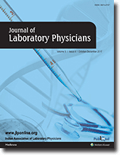
Journal of Laboratory Physicians
Empowering laboratory physicians with essential knowledge.The Journal of Laboratory Physicians is a prestigious, peer-reviewed publication dedicated to advancing the field of laboratory medicine. Published by THIEME MEDICAL PUBL INC, this journal has established itself as a vital source of research and clinical insights since its inception, transitioning to Open Access in 2009 to broaden its reach and accessibility. With an ISSN of 0974-2727 and an E-ISSN of 0974-7826, it aims to provide a platform for professionals, researchers, and students engaged in laboratory-based studies to share critical findings and foster collaboration across disciplines. The journal's scope encompasses a wide range of topics relevant to laboratory physicians, ensuring that it remains an essential resource for those seeking to stay on the cutting edge of laboratory practices and innovations. By disseminating timely research and reviews, the Journal of Laboratory Physicians plays a crucial role in enhancing the quality of healthcare through improved laboratory services.
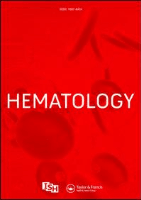
Hematology
Unlocking Potential: Pioneering Research in Blood DisordersHematology is a distinguished open-access journal published by Taylor & Francis Ltd, dedicated to advancing research and knowledge in the field of hematology. Established in 1996, the journal has continually evolved to meet the needs of a growing community of researchers and practitioners, providing a vital platform for disseminating innovative findings and clinical insights. With its impact factor reflecting a robust commitment to quality scholarship, Hematology has achieved a respectable position in its category as evidenced by its Q3 ranking in the Hematology category and ranks #85 out of 137 in the Scopus index, which positions it in the 38th percentile among its peers. The journal’s open-access policy, initiated in 2019, further enhances its reach and accessibility, allowing a broad audience of professionals, researchers, and students to engage with high-quality research without barriers. By covering a wide range of topics related to blood disorders, treatment methodologies, and emerging therapies, Hematology stands as an essential resource for those dedicated to innovation in this critical area of healthcare.

Malaysian Journal of Pathology
Unveiling the intricacies of pathology since 1979.Malaysian Journal of Pathology, published by the MALAYSIAN JOURNAL PATHOLOGY, stands as a pivotal resource in the fields of pathology and medicine, contributing rich insights since its inception in 1979. This peer-reviewed journal, based in Malaysia, is dedicated to disseminating original research, review articles, and case studies that advance the understanding of disease mechanisms and diagnostics. With a current impact factor reflecting its ranked positioning—Q4 in Cell Biology, Q4 in Histology, and Q3 in both Miscellaneous Medicine and Pathology & Forensic Medicine—this journal serves as an essential platform for researchers, clinicians, and students alike. Although it operates without open access, its scholarly rigor and contributions are well recognized, holding ranks such as #84 in Pathology and Forensic Medicine according to Scopus. The Malaysian Journal of Pathology is committed to fostering innovation and excellence in medical research, making it an invaluable tool for professionals seeking to stay abreast of significant advancements in the pathology domain.
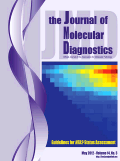
JOURNAL OF MOLECULAR DIAGNOSTICS
Empowering healthcare with cutting-edge diagnostic insights.The Journal of Molecular Diagnostics is a premier publication in the fields of molecular medicine and pathology, published by Elsevier Science Inc. With an impressive impact factor and recognized as a Q1 journal in both Molecular Medicine and Pathology and Forensic Medicine, this journal is dedicated to advancing the understanding and application of molecular diagnostics in clinical practice. The journal features rigorous peer-reviewed research, comprehensive reviews, and cutting-edge methodologies that highlight novel diagnostic tests and biomarkers. Researchers, professionals, and students in the biomedical sciences are invited to explore its diverse array of articles and contribute to a growing body of knowledge critical for innovation in healthcare delivery. Located in the Netherlands, the journal has secure its position among the top-tier journals with its recent Scopus ranking of 20th out of 208 in Medicine Pathology and Forensic Medicine, reflecting a strong percentile ranking of 90th. With coverage spanning from 1999 to 2024, the Journal of Molecular Diagnostics remains a vital resource for anyone committed to the future of molecular research and diagnostics.

Journal of Blood Medicine
Advancing Hematology: Unveiling Breakthroughs in Blood MedicineThe Journal of Blood Medicine, published by DOVE MEDICAL PRESS LTD, stands as a vital resource in the field of hematology, focusing on the latest research developments and clinical advancements in blood medicine. With an impact factor reflective of its growing relevance, this open-access journal has been delivering quality scholarly work since 2010, ensuring that critical research is readily available to the global scientific community. The journal operates under an open-access model, further enhancing its dissemination and accessibility to researchers, professionals, and students alike. In the 2023 rankings, it secured a Q3 category status within hematology and achieved a commendable 76th rank out of 137 in Scopus listings, indicating its commitment to quality and innovation in this specialized area. Located in New Zealand, the journal's diverse topics encompass clinical research, treatment modalities, and emerging therapies, contributing significant insights vital for shaping future advancements in blood medicine.
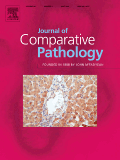
JOURNAL OF COMPARATIVE PATHOLOGY
Innovating Understanding in Veterinary SciencesJOURNAL OF COMPARATIVE PATHOLOGY, published by Elsevier Science Ltd, stands as a significant publication within the fields of pathology and forensic medicine, as well as veterinary studies. With an ISSN of 0021-9975 and an E-ISSN of 1532-3129, this journal has been disseminating critical research since 1950, contributing to the advancement of knowledge through its focus on comparative pathology. The journal's reputable standing is underscored by its Q3 classification in Pathology and Forensic Medicine and Q2 in Veterinary (miscellaneous) for 2023, reflecting its vital role in shaping contemporary discourse in these domains. The Scopus ranks further solidify its presence, placing it at the 51st percentile in general veterinary sciences and the 32nd percentile in pathology—a testament to the quality and relevance of the contributions it publishes. Although it operates under a subscription model, the journal remains accessible to researchers and practitioners who aim to deepen their understanding of pathological phenomena across species, enhance diagnostic accuracy, and improve clinical practices. With a steadfast commitment to rigorous peer review and a global readership, the JOURNAL OF COMPARATIVE PATHOLOGY is an essential resource for those engaged in research and professional practice, fostering collaborations and innovations that bridge complementary areas of study.
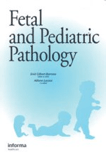
Fetal and Pediatric Pathology
Exploring the complexities of fetal and pediatric pathology.Fetal and Pediatric Pathology, an esteemed journal published by TAYLOR & FRANCIS INC, is dedicated to advancing the field of pediatric and fetal medicine through the dissemination of high-quality research and clinical insights. With an ISSN of 1551-3815 and an E-ISSN of 1551-3823, the journal has been a key resource for researchers and practitioners since its inception in 1983. Based in the United Kingdom, it covers a broad spectrum of topics relevant to Medicine, Pathology and Forensic Medicine, and Pediatrics, Perinatology, and Child Health, consistently reflecting on contemporary challenges faced in these fields. The journal has attained a commendable Q3 ranking within its categories as of 2023, underlining its relevance in the academic community. Though not an open-access publication, the research presented in Fetal and Pediatric Pathology plays a pivotal role in informing practice, guiding future studies, and enhancing the understanding of diseases affecting fetuses and children. Its convergence of research throughout multiple years, continuing until 2024, marks it as a crucial platform for ongoing scientific dialogue and innovation, aimed at fostering better health outcomes for younger populations.

Clinical Pathology
Unlocking Insights for Enhanced Diagnostic PracticesClinical Pathology, an esteemed journal published by SAGE Publications Ltd, stands at the forefront of advancing knowledge in the intersection of histology, microbiology, and pathology. As an Open Access journal since 2019, it provides researchers and healthcare professionals seamless access to high-quality, peer-reviewed articles that contribute to the field's growing body of knowledge. With a focus on enhancing diagnostic methodologies and advancing clinical applications, Clinical Pathology serves a diverse audience eager to explore innovative research and practical insights. The journal currently holds Q3 status in Histology and Pathology and Forensic Medicine, and Q4 in Medical Microbiology, reflecting its commitment to rigorous scholarship within a competitive landscape. Its ranking in Scopus further positions it as a vital resource for professionals striving for excellence in clinical and experimental pathology. We invite researchers, students, and professionals to engage with the latest findings and share their valuable contributions to help propel the field forward.

Blood Transfusion
Connecting Research with Clinical Practice in Hematology.Blood Transfusion is a leading journal in the fields of Hematology, Immunology, and Medicine, published by SIMTIPRO SRL in Italy. With its ISSN 1723-2007, the journal has established a significant presence in the academic community, as evidenced by its positioning within the Q2 category in Hematology and Medicine (miscellaneous) and Q3 in Immunology and Allergy for 2023. Notably, it ranks #38 out of 137 in the Hematology category, showcasing its impactful contributions to research and practice. Operating under a traditional publishing model, this journal provides valuable insights into advances in blood transfusion science, ultimately aimed at enhancing patient care and outcomes. Spanning from 2003 to 2024, the scope of Blood Transfusion covers a wide range of topics related to hematological and immunological research, making it an essential resource for researchers, healthcare professionals, and students engaged in these critical fields.
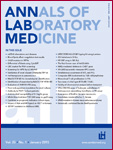
Annals of Laboratory Medicine
Innovating Diagnostics for a Healthier TomorrowAnnals of Laboratory Medicine, published by the KOREAN SOC LABORATORY MEDICINE, stands as a pivotal resource for researchers and practitioners in the fields of clinical and medical biochemistry. With a strong Q2 ranking in both Biochemistry (medical) and Clinical Biochemistry, along with a prestigious Q1 status in miscellaneous Medicine categories, this journal emphasizes the significance of laboratory medicine in improving patient outcomes and advancing scientific understanding. Established in 2012, the journal has demonstrated an impressive trajectory of growth and scholarly contribution, making it a reliable source of high-quality research and insightful reviews. The journal utilizes open access, enhancing the reach of its findings across the global scientific community. Operating from South Korea, Annals of Laboratory Medicine aims to foster dialogue and collaboration among professionals, contributing to the continuous advancement of laboratory methodologies and diagnostics.